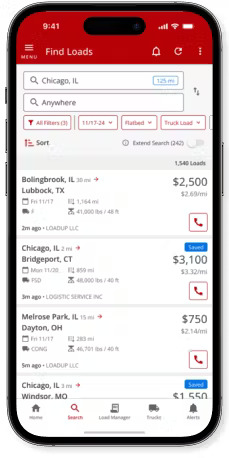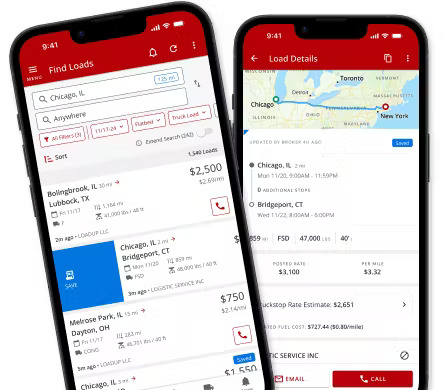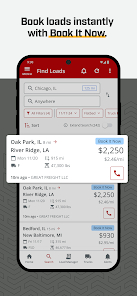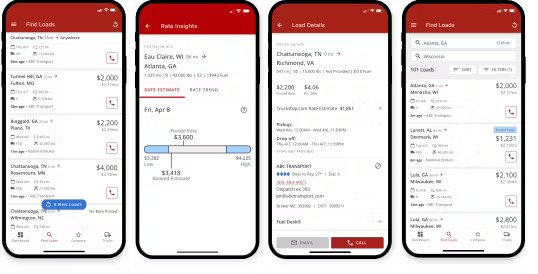Role
Sr. Product Manager, Mobile Platform
Timeline
2023 - 2025
Key Skills




Project Overview
At Truckstop, I led the development of an AI-powered load matching system that transformed how freight carriers and shippers connect. The mobile marketplace platform implemented sophisticated matching algorithms and location-based search functionality to create a more efficient freight ecosystem.
The project included designing and launching a system that improved recommendation accuracy by 35%, leading to a 22% increase in user engagement, 15% reduction in churn, and 18% decrease in empty miles. I also led the international product expansion into the Spanish-speaking market, managing end-to-end localization, go-to-market strategy, and customer experience support.
Key Challenges
- The freight industry relied heavily on manual processes and phone calls to match carriers with available loads, creating inefficiencies and missed opportunities.
- Carriers often drove with empty trailers (deadheading) due to lack of visibility into available loads along their routes.
- Pricing opacity led to inefficient negotiations and missed opportunities for both carriers and shippers.
- International expansion required not just language translation but adaptation to different regional freight practices and regulations.
Solution & Approach
AI-Powered Matching
Developed a sophisticated machine learning algorithm that analyzed historical data, carrier preferences, and real-time market conditions to recommend the most relevant loads to carriers. Continuously improved the model based on user interactions and outcomes.
Location-Based Intelligence
Implemented geospatial features that allowed carriers to find loads along their routes, reducing empty miles. Created location-based alerts for new loads that matched carrier preferences in their vicinity.
Market Rate Insights
Developed a pricing transparency tool that provided real-time rate information based on lane, equipment type, and market conditions. Enabled carriers and shippers to make more informed decisions and negotiate fair rates.
Key Features
Smart Load Search
Created an intelligent search interface that combined AI recommendations with powerful filtering options. Carriers could quickly find loads based on origin, destination, equipment type, weight, and other criteria, with results ranked by relevance to their preferences.

Load Details & Booking
Designed a comprehensive load details view that provided all the information carriers needed to make booking decisions. Included pickup and delivery details, dimensions, weight, rate information, special requirements, and shipper ratings. Implemented a streamlined booking process to reduce friction.

Rate Insights
Developed a market rate analysis tool that showed historical and current rate trends for specific lanes. Carriers could see how the offered rate compared to market averages and make more informed decisions about which loads to accept.

Spanish Language Support
Implemented comprehensive Spanish language support throughout the app, including load descriptions, notifications, and customer support. Adapted the interface to accommodate longer Spanish text and ensured all terminology was accurately translated for the freight industry.

Results & Impact
35% improvement in recommendation accuracy
The AI-powered matching system significantly increased the relevance of load recommendations, leading to higher booking rates.
22% increase in user engagement
Carriers spent more time in the app and interacted with more loads due to improved recommendations and user experience.
15% reduction in churn
Better matching and more successful bookings led to higher carrier retention rates.
18% decrease in empty miles
Location-based features helped carriers find loads along their routes, reducing deadheading and increasing profitability.
12% growth in active carrier users
The improved platform attracted new carriers and reactivated dormant users.
$3.5M in first-year revenue from Spanish market
The international expansion successfully tapped into the Spanish-speaking carrier market.
Key Learnings
AI Requires Human Context
While AI significantly improved matching accuracy, we found that incorporating domain expertise and human feedback was essential. The most successful approach combined machine learning with insights from experienced freight professionals who understood the nuances of the industry.
Localization Beyond Translation
International expansion taught us that effective localization goes far beyond language translation. Understanding regional freight practices, regulatory differences, and cultural nuances was crucial to creating a product that resonated with Spanish-speaking carriers.